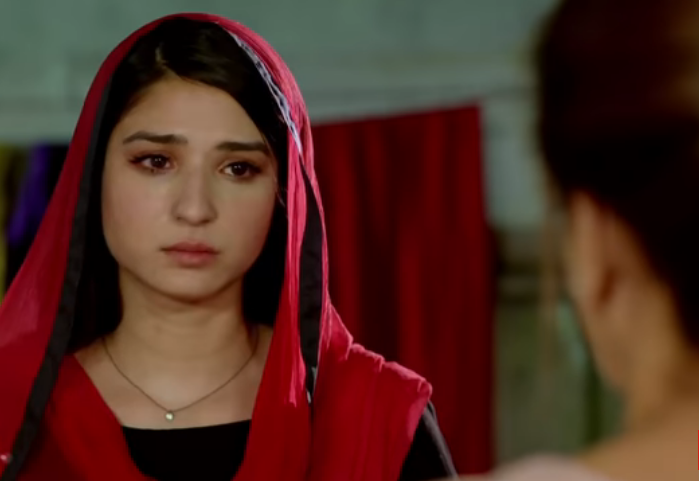“Ghisi Piti Mohabbat” does not claim to tell a different story – rather, it tells the viewer straight away in the title that this is the same old story we’ve seen time and time again. So what makes “Ghisi Piti Mohabbat” different? It’s all in the treatment. This show takes all the done-to-death cliches and throws them all into the show back to back, but presenting them in a different way. The viewer is forced to confront society’s double standards and hypocrisies while watching – and doing it all while laughing. This Ramsha Khan and Wahaj Ali starrer may not have a humorous storyline, but without a doubt, it is a comedy – and a great one.
The opening scene between Riz (Wahaj Ali) and Noor (Arjumand Rahim) is the stand-out moment of this episode. Noor is a villain, the “villain” we see so often in dramas, the woman who lures a man away from his wife, his obligations, his family life. But is Noor really a villain? As Riz lashes out at Noor for her deception and begs her to stay with him, proclaiming that he will die without her, Noor voices several thoughts that will find most women nodding along in agreement. It’s applause-worthy when Noor gives back to Riz, stating that he doesn’t love her, but simply wanted an excuse to leave Samia and latched on to her. And though Noor is callous and manipulative, it’s cheer-worthy when she tells Riz that women die for men every day, so it’s acceptable to her if he and a few other men die as well. While Noor could not be called a “feminist,” she is a woman who lives life on her own terms, regardless of how her personal rules and regulations affect others. She is a pessimist in love, but she is an individual who knows how to use love and emotions to her personal gain and advantage. Will this be the last we see of Noor? That’s not clear, but she has taught Riz a heavy lesson and while this “quick karma” may have been a bit too quick, it’s satisfying. Arjumand Rahim has excelled in this role.
As Riz is seen mourning the loss of both Noor and Samia, we see Samia (Ramsha Khan) reacting in a very different way. Yes, she’s upset, yes she’s mourning as well, but she handles the loss practically. While she’s seen waking up confident and ready to face the world, she also asks for a “perfect” paratha, just one perfect thing in her life on a morning when nothing is perfect. The depth of that seemingly silly scene where Samia behaves so flippantly about her marriage is anything but silly, Samia mourning internally over the loss of something she thought was perfect (for her), but ended up being entirely flawed. Samia continues to be the heroine we have been yearning for, determined to go back to work as her family bickers about “iddat” and the concept of the woman remaining at home after a divorce. Samia calls out both her father and her Phupo’s hypocrisy when the two realize the concept of Iddat is not functional when there’s a household relying on her income. Again, Fasih Bari Khan’s writing here is the winner as he highlights how our society’s education on iddat and how it works is less knowledge and moreso based on what others around us say. Even her kind-hearted co-worker (and potential love interest?) is seen questioning her on working during her iddat period and she shuts him down, unwilling to allow wagging mouths in her personal life. This character seems genuine though and one can’t help rooting for him. Will he be the husband and life partner Samia is (not) searching for?
Khalil (Shahood Alvi) is a man like many around us, a man who is one thing to the outside world and another inside his own home. While Khalil may look like a solid, stand-up family man to outsiders, his wife Farkhanda (Shaheen Khan) is only too aware of his sleazy nature. While Khalil is a more prominent character, credit must be given to Shaheen Khan for how she is playing Farkhanda. Battling his dirty gaze on other women for years, she finally gives him permission to marry again, but it’s clear how much this woman has endured before coming to this point. When her elderly mother-in-law comes to visit, Farkhanda informs her that Khalil is ready to marry a woman his own son’s age and her mother-in-law supports Khalil. While Farkhanda is a modern, well-put-together, cultured lady, that does not stop Khalil’s roving eye and there’s a dialogue Khalil spouts off to Farkhanda in this episode, taunting her for being well-past her “expiry date” and being replaced by a younger model. His attitude towards women makes it clear that he believes women are commodities. Is Khalil simply an older version of Rizwan – or is there hope for Rizwan yet to grow into something better than this overgrown child?
http://thebrownidentity.com/2020/10/10/ghisi-piti-mohabbat-episode-10-rizwan-and-samias-marriage-falls-apart/
There is also a track running parallel to Samia’s story that features Samia’s sister and her to-be husband. It’s clear that the girl is not interested in her fiancé, but with her sister’s divorce dilemma, she is unable to say no to her parents. This drama will come to the forefront in the next episode as things heat up. “Ghisi Piti Mohabbat” manages to churn one an episode each week that is better than the last. There are several strong moments in episode 11 and a round of applause must be given not only to the actors, but to the writer, (Fasih Bari Khan) and director (Ahmed Bhatti) as well. This show continues to be the best show on air at the moment, alongside “Prem Gali.” “Ghisi Piti Mohabbat” is a must-watch.
